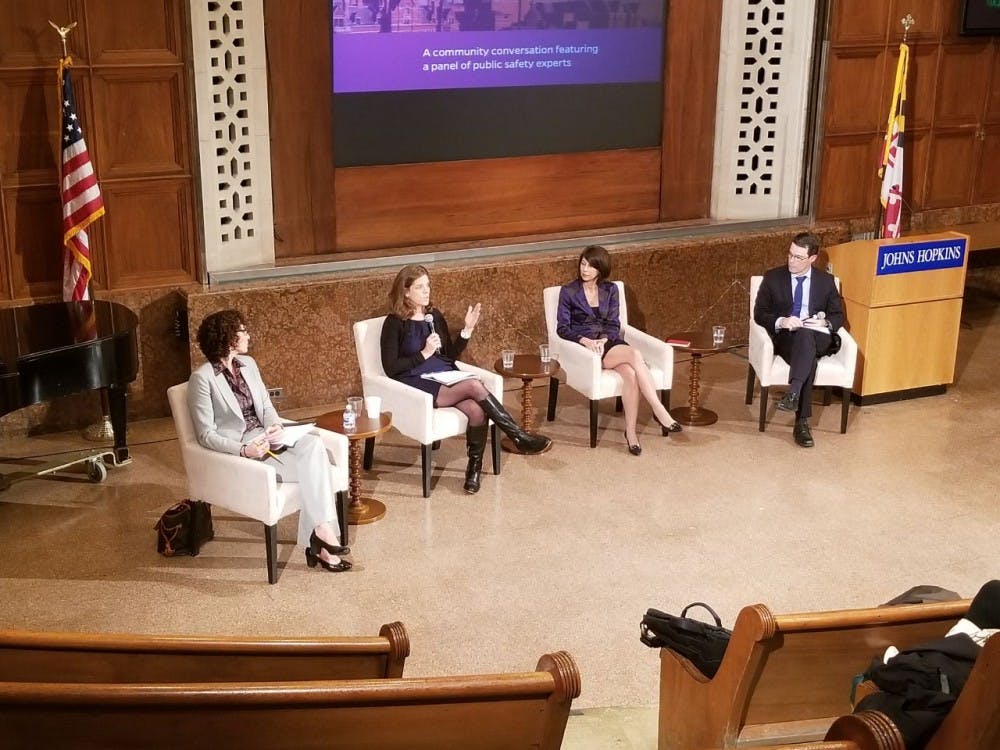The University hosted the second of a three-part series on policing and security on Friday, Nov. 9 on the East Baltimore campus. The discussion, titled “Constitutional Policing and Police Accountability,” consisted of a moderated discussion between a panel of experts and an audience Q&A session.
The panel included Nancy La Vigne, vice president for justice policy at the Urban Institute; Chrisy Lopez former deputy chief in the Special Litigation Section of the Civil Rights Division at the U.S. Department of Justice; and Vesla Weaver, Bloomberg Distinguished Associate Professor of Political Science and Sociology. The discussion was moderated by Daniel Webster, professor of Health Policy and Management at Bloomberg.
The discussion was intended to provide space for community members and Hopkins affiliates to provide feedback on the proposed private police force. Many members of the audience, such as Bloomberg student Delaine Powerful, did not feel that the University listened to the audience concerns expressed during the talk.
“What is actually happening is that people are speaking at us for an hour and then fielding five or six questions and then responding in a very defensive way like they did today,” Powerful said. “It’s not actually hearing students; there’s no representation of students or the community represented on the panel.”
Weaver began her introduction with three stories about police interactions experienced by black children.
“‘I can remember when we couldn’t go onto Johns Hopkins University; on their campus, as black kids, we couldn’t go on that campus because the caretakers would run us down,’” Weaver quoted from an interview. “‘If they ever caught you, they slapped you around. They called the policemen, they’d tell a big damn lie on you.’”
She emphasized that the childhood interactions with police can lead to lasting trauma and that police should only be a last resort for children.
“These are not momentary encounters; this is a lasting memory of state violence. This is often the first memory that people have of their government, of their municipality, of agents of political authority,” Weaver said.
According to Weaver, a study which looked at the policing habits across 11 jurisdictions showed that the use of police force was greater against black children than against white adults.
La Vigne spoke about her own research on public opinion of policing in high-crime, low-income areas. She emphasized highlighting minority voices, since they are more heavily impacted by policing.
“Community sentiment cannot be captured by the people who show up to forums like this,” La Vigne said. “There are other community members and experiences that are not captured that way.”
The discussion then opened up to questions from the audience.
Powerful questioned why the conversation seemed to be focused on police reform rather than alternatives to policing, when many of the panelists emphasized the negative impacts of over-policing on marginalized communities. In an interview with The News-Letter, she elaborated on this point.
“I kept hearing again that there are so many negative things about the police. We know that it’s not actually protecting people,” Powerful said. “Why do we have the biggest public health institution in the world and we are not actually looking at solutions that address the problem, and instead are just looking at band-aid solutions, which is what policing is?”
Lopez addressed this question during the discussion and offered an alternative to policing.
“The answer might not be satisfying because while there are some new innovations, the answer is actually not that new: It is divest, reinvest,” Lopez said. “We’ve got to shift resources from where they’ve been going for the past decades into policing and move them back into social services.”
David Tian, a graduate student in the Political Science Department, spoke about a positive experience he had with the police department at his undergraduate university. In an interview with The News-Letter, Tian explained that he shared his experience in order to add more nuance to the conversation.
“The issue of policing is a very complicated issue and no one in the United States would deny that there is problems with it. I think it’s much too nuanced of an issue to say ‘all police is good’ or ‘all police is bad,’ and I think that’s what the issue is becoming,” Tian said.
Tian stated that he would be supportive of a private police force if the University first addressed the concerns brought up by members of the community.
“I do consider myself someone who is pro-police, not because I don’t recognize that there are problems in policing,” Tian said. “I think being pro-police is to recognize that the difficult and dangerous work that they do whilst still holding them to extremely high standards for the incredible power that they hold.”





